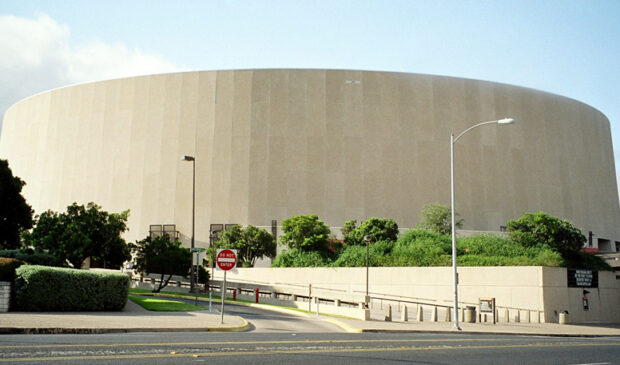Erwin Center demolition marks latest change in ever-shifting health care district
Tuesday, May 9, 2023 by
Chad Swiatecki Demolition of the Frank Erwin Center arena on the University of Texas campus is expected to begin next month, following approval last week from UT leaders to move ahead with the $25 million teardown of the longtime home for both university basketball teams.
The vote by the UT Board of Regents also spells the end for the neighboring Denton Cooley Pavilion basketball training facility. Once the demolition is complete next fall, the property will be made available for further expansion of the Dell Medical School, which is currently focused around the Dell Seton Medical Center that opened in 2017.
There are no definite plans for how the medical school or its surrounding health care Innovation District will use the former Erwin Center site, but a 2013 master plan suggested academic and research buildings, parking and housing could be located there.
The opening of the Moody Center arena nearby last spring spelled the end for the 46-year-old arena, with the demolition serving as the latest change for a portion of downtown that is in transition both in terms of redevelopment efforts and what direction the medical school will take in the coming years.
The Dell Seton teaching hospital is currently at the center of a complicated and long-developing legal battle between Central Health, the public hospital district for Travis County, and Ascension Texas, the private partner that manages the hospital created to teach med school students and provide health care to vulnerable populations in the area.
The two groups sued each other in January over how both have handled funding and logistics related to the public health care services portion of their agreement, with Central Health looking to take control of the hospital as one result of the legal battle. The latest development over the issue came last week when Ascension Texas sent Central Health a notice of “governance and funding gridlock” that is expected to force executives from both groups to reconvene and perhaps begin a new mediation process.
In a somewhat related matter, last month Travis County Commissioners Court voted to move forward with an $800,000-plus audit of Central Health. At issue is how Central Health has utilized the $35 million in annual bond money approved by voters to fund public health efforts at the medical school.
Only 4 percent of that money was used for care delivery, with the rest being spent on “fundraising, admissions, the dean’s office, business affairs, non-clinical research, and undergraduate medical education,” according to subpoena data disclosed last year.
Whatever is ahead for the medical school, local business leaders have high hopes for the economic impact of the larger effort to attract and incubate health care companies in Austin. A study released last year by UT’s IC2 Institute found that from 2015 through 2021 the medical school had already attracted $96.5 million in outside funding and investment. Included in that data were disclosures of 143 inventions intended for patent filings, with 77 provisional patents and 12 completed patents.
The business development work being led by Capital City Innovation and other groups in the health care district was expected to generate $293 million in economic impact, according to a 2021 analysis by the Downtown Austin Alliance. That figure represented a 50 percent increase in impact for the area without a focus on health care.
The transformation of the properties around the medical school is also well underway, with the former site of Brackenridge Hospital sprouting a 17-story tower in 2021 and the larger tract approved by City Council for a planned unit development. Nearby, the former HealthSouth property has been slated for redevelopment by Aspen Heights Partners, with City Council last year giving the OK to plans that call for more than 200 units of affordable housing among other community benefits.
Photo made available through a Creative Commons license.
The Austin Monitor’s work is made possible by donations from the community. Though our reporting covers donors from time to time, we are careful to keep business and editorial efforts separate while maintaining transparency. A complete list of donors is available here, and our code of ethics is explained here.
You're a community leader
And we’re honored you look to us for serious, in-depth news. You know a strong community needs local and dedicated watchdog reporting. We’re here for you and that won’t change. Now will you take the powerful next step and support our nonprofit news organization?






